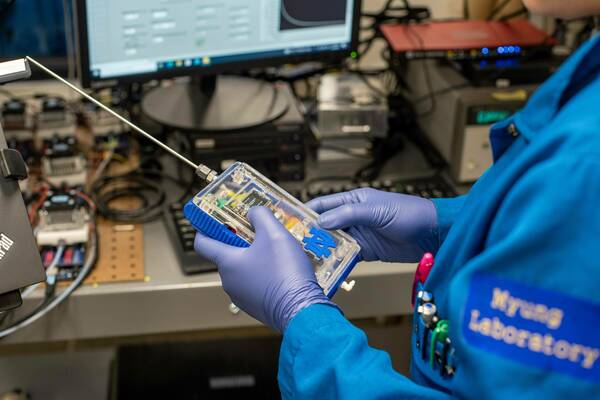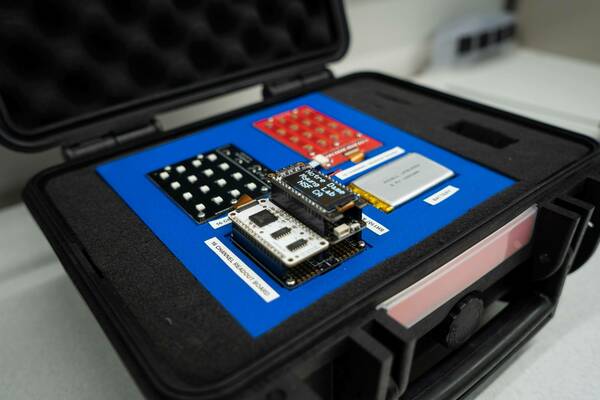Researchers to develop electronic nose for rapid disease detection

The U.S. National Science Foundation (NSF) Convergence Accelerator Program has awarded $650,000 to the University of Notre Dame to support the development of an advanced electronic nose that researchers say could help prevent the next pandemic.
“Human health is linked with animal health, and we saw during the COVID-19 pandemic what can happen when a disease passes from animals to humans and continues to spread uncontained,” explained Nosang V. Myung, the Bernard Keating-Crawford Endowed Professor in the Department of Chemical and Biomolecular Engineering.
Myung, who also directs the micro- and nanoscale biomedical instrumentation theme at the Berthiaume Institute for Precision Health, will lead the development of the new technology. His team is one of 16 teams awarded under Track L: Real-World Chemical Sensing Applications.
Myung said the electronic nose will build on existing technologies developed in his lab at Notre Dame. It will complement conventional disease prevention and management approaches by adding real-time disease monitoring.

To build the device, Myung and his team of collaborators will develop new, high-sensitivity materials using nano-engineering processes. Still, Myung says the device will be portable and affordable, so it can be used on-site by farmers, packing plant inspectors, animal husbandry technicians and others.
“The idea is to use data to make critical decisions quickly — to isolate or treat infected animals, for example — to minimize the spread of diseases,” Myung explained.
During the project’s first phase, Myung and his collaborators will equip the electronic nose to detect avian flu, which resulted in more than 40 million animal deaths and over $2.5 billion in economic losses during a 2022 outbreak. The researchers will gather data from infected birds and healthy birds and will employ machine-learning techniques to train the electronic nose to distinguish between the two.
At the same time, Emily Stoler, assistant director of risk assessment at Notre Dame’s IDEA Center, will work with Myung and his team to evaluate and pursue potential commercial opportunities associated with the electronic nose technology.
During the project’s second phase, the researchers will train the electronic nose to detect an array of other infections, both in animals and in humans. The end result will be a flexible monitoring system that can be taken to sites where infections are most likely to occur or spread.
Finally, the researchers will develop a user-friendly graphic interface that allows users to operate the device wirelessly using a smartphone and see results in real-time.

Although it has been two decades since a landmark experiment found that dogs were effective at using smell to detect human bladder cancer, the use of smell for disease diagnosis remains rare. Myung said the new device has the potential to show that smell is a valuable surveillance technique that can be affordable, accessible and also highly sensitive. The team predicts that the electronic nose will be capable of detecting smells at a sensitivity of one part per billion.
The academic collaborators who will join Myung in developing the electronic nose technology include:
- Richard Bowen, a professor of reproductive biology and virology at Colorado State University. Bowen also directs the Animal Models Core of the Rocky Mountain Regional Center of Excellence for Biodefense and Emerging Infectious Disease.
- Yamil Colón, assistant professor in Notre Dame’s Department of Chemical and Biomolecular Engineering. Colón is an expert in computational materials discovery and design.
- Bruce Kimball, a chemical ecologist at the Monell Chemical Senses Center. Monell is an independent, nonprofit scientific institute dedicated to interdisciplinary basic research on taste and smell.
To learn more, visit myung-lab.com.
Originally published by at research.nd.edu on Feb. 16.
Latest ND NewsWire
- School of Architecture charrette yields $98M for downtown Kalamazoo public space regenerationOn June 27, the city of Kalamazoo, Michigan, announced that it was awarded a $25 million grant through the U.S. Department of Transportation’s Rebuilding American Infrastructure with Sustainability and Equity (RAISE) program, as a result of its work with the University of Notre Dame School of Architecture. The grant, which will support the restructuring of downtown Kalamazoo thoroughfares and public spaces, is the latest of $98 million in grant funding the city has received following an intense, weeklong urban planning session conducted by the School of Architecture’s Housing and Community Regeneration Initiative in August 2022.
- New women’s residence hall to be named for Therese Mary GrojeanTherese Mary Grojean Hall The family of Thomas F. Grojean Sr.,…
- School of Architecture partners with city of Gary on downtown revitalization planOn Monday (July 22), the University of Notre Dame School of Architecture’s Housing and Community Regeneration Initiative and the city of Gary, Indiana, launched the first phase of a downtown revitalization project.
- Transformed Institute for Ethics and the Common Good advances Notre Dame’s commitment to excellence in study of ethicsThe University of Notre Dame’s Institute for Advanced Study is now the Institute for Ethics and the Common Good, launching its website today at ethics.nd.edu. The transformed, expanded institute will play an essential role in advancing the University-wide Ethics Initiative emerging from “Notre Dame 2033: A Strategic Framework.”
- ND Expert: Will ‘Brat Girl Summer’ translate into an autumn of Democratic victories? ‘It’s anybody’s guess’In the past three days, people on social media have embraced British pop star Charli XCX’s online pronouncement that “Kamala IS brat.” According to to Sara Marcus, an assistant professor of English and author of “Girls to the Front: The True Story of the Riot Grrrl Revolution,” that translates to a declaration that Kamala Harris, the Democratic Party’s presumptive new nominee for president, embodies the sort of messy, complicated, casual womanhood that the singer’s recent album, “Brat,” depicts and celebrates.
- ND Expert: NASA’s cancellation of VIPER is a frustrating setback for lunar explorationLast week, NASA announced it canceled its plans to send the Volatiles Investigating Polar Exploration Rover (VIPER) to the Moon’s southern polar region. The rover was meant to search for water and other resources called volatiles, such as hydrogen, ammonia and carbon dioxide, which easily evaporate…













